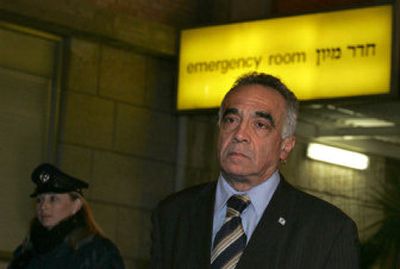Sharon’s stroke rattles Middle East

JERUSALEM – Ariel Sharon’s massive stroke threw Israeli politics and Mideast peacemaking efforts into turmoil, threatening momentum for a deal with the Palestinians and enhancing the position of hard-liners.
The Israeli prime minister broke away from the Likud Party of Benjamin Netanyahu in November, and the new centrist party he formed had been the favorite to win March 28 elections. But Kadima was largely a one-man show that would have an uncertain future without the 77-year-old Sharon.
Medical experts said the chances are slim for Sharon to make a full recovery from the kind of massive stroke he suffered Wednesday.
In recent months, many Israelis have placed high hopes on Sharon as the politician best positioned to draw Israel’s final borders in a settlement with the Palestinians.
The prime minister – once his country’s foremost champion of Jewish settlement-building in the West Bank and Gaza – in September became the first Israeli leader to relinquish land the Palestinians claim for a future state when he led Israel out of the Gaza Strip.
Sharon’s transformation from hawk to pragmatist – combined with last year’s death of longtime Palestinian leader Yasser Arafat – has given the Middle East a chance for a return to peacemaking after five years of relentless bloodshed.
In March, Sharon had been expected to face off against Netanyahu, the tough-talking former prime minister who recently won the Likud primaries, and Amir Peretz, the union leader who recently unseated veteran Israeli politician Shimon Peres as head of the liberal Labor Party.
None of Sharon’s possible successors was seen as having his ability to pull together the next ruling coalition.
Sharon’s deputy, former Jerusalem Mayor Ehud Olmert, has already taken over the reins of power after the stroke and could emerge as Sharon’s successor heading the Kadima, or Forward, party.
Olmert, although a familiar face in Israeli politics, would likely have a far tougher time beating either Netanyahu or Peretz than Sharon would have.
After losing to Peretz in the Labor primaries, Peres, a Nobel Peace Prize laureate, joined Sharon in Kadima, and it was not clear if he would seek leadership of the new party. The 82-year-old Peres, though serving briefly as prime minister three times, has never won an Israeli election outright and lost to Netanyahu in 1996.